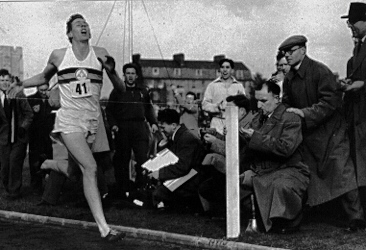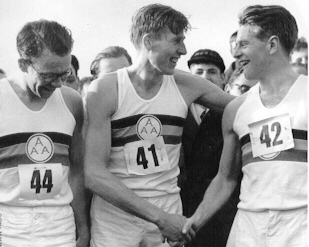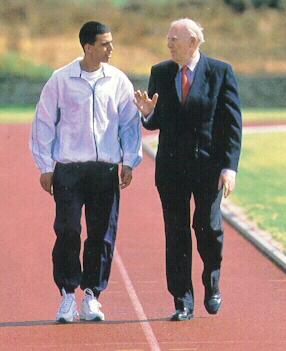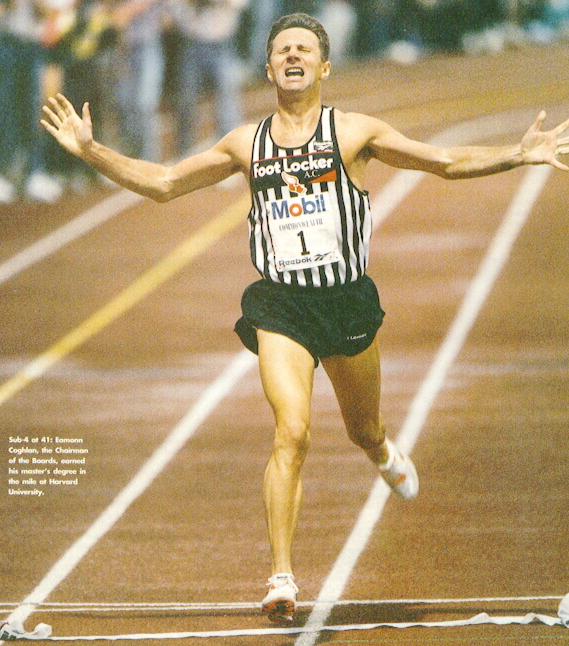
THE FOUR MINUTE MILE!
Roger Bannister
May 6, 1954
3:59.4

Here's how Roger Bannister himself described one of the greatest moments in sports:
"There was complete silence on the ground ... a false start ... I felt angry that precious moments during the lull in the wind might be slipping by. The gun fired a second time ... Brasher went into the lead and I slipped in effortlessly behind him, feeling tremendously full of running. My legs seemed to meet no resistance at all, as if propelled by some unknown force.
We seemed to be going so slowly! Impatiently I shouted 'Faster!' But Brasher kept his head and did not change the pace. I went on worrying until I heard the first lap time, 57.5 sec. In the excitement my knowledge of pace had deserted me. Brasher could have run the first quarter in 55 seconds without my realising it, because I felt so full of running, but I should have had to pay for it later. Instead, he made success possible.
At one and a half laps I was still worrying about the pace. A voice shouting 'relax' penetrated to me above the noise of the crowd. I learnt afterwards it was Stampf's. Unconsciously I obeyed. If the speed was wrong it was too late to do anything about it, so why worry? I was relaxing so much that my mind seemed almost detached from my body. There was no strain.
I barely noticed the half-mile, passed in 1 min. 58 sec., nor when, round the next bend, Chataway went into the lead. At three quarters of a mile the effort was still barely perceptible; the time was 3 min 0.7 sec., and by now the crowd was roaring. Somehow I had to run that last lap in 59 seconds. Chataway led round the next bend and then I pounced past him at the beginning of the back straight, three hundred yards from the finish.
I had a moment of mixed joy and anguish, when my mind took over. It raced well ahead of my body and drew my body compellingly forward. I felt that the moment of a lifetime had come. There was no pain, only a great unity of movement and aim. The world seemed to stand still, or did not exist. The only reality was the next two hundred yards of track under my feet. The tape meant finality - extinction perhaps.
I felt at that moment that it was my chance to do one thing supremely well. I drove on, impelled by a combination of fear and pride. The air I breathed filled me with the spirit of the track where I had run my first race. The noise in my ears was that of the faithful Oxford crowd. Their hope and encouragement gave me greater strength. I had now turned the last bend and there were only fifty yards more.
My body had long since exhausted all its energy, but it went on running just the same. The physical overdraft came only from greater willpower. This was the crucial moment when my legs were strong enough to carry me over the last few yards as they could never have done in previous years. With five yards to go the tape seemed almost to recede. Would I ever reach it?
Those last few seconds seemed never-ending. The faint line of the finishing tape stood ahead as a haven of peace, after the struggle. The arms of the world were waiting to receive me if only I reached the tape without slackening my speed. If I faltered, there would be no arms to hold me and the world would be a cold, forbidding place, because I had been so close. I leapt at the tape like a man taking his last spring to save himself from the chasm that threatens to engulf him.
My effort was over and I collapsed almost unconscious, with an arm on either side of me. It was only then that real pain overtook me. I felt like an exploded flashlight with no will to live; I just went on existing in the most passive physical state without being quite unconscious. Blood surged from my muscles and seemed to fell me. It was as if all my limbs were caught in an ever-tightening vice. I knew that I had done it before I even heard the time. I was too close to have failed, unless my legs had played strange tricks at the finish by slowing me down and not telling my tiring brain that they had done so.
The stop-watches held the answer. The announcement came - 'Result of one mile .. time, 3 minutes' - the rest was lost in the roar of excitement. I grabbed Brasher and Chataway, and together we scampered round the track in a burst of spontaneous joy. We had done it - the three of us!"
(The actual announcement went as follows: "Ladies and gentlemen, here is the result of event 9, the one-mile: 1st, No. 41, R.G. Bannister, Amateur Athletic Association and formerly of Exeter and Merton Colleges, Oxford, with a time which is a new meeting and track record, and which - subject to ratification - will be a new English Native, British National, All-Comers, European, British Empire, and World Record. The time was 3..." Quoted from Track & Field News, February, 1998.)

From: "The Four Minute Mile" by Roger Bannister, Lyons & Burford, 1955, pgs. 212-215.
For more interesting background on this famous race see: The Tommy Hulatt Page.

Hicham El Guerrouj held the world record for the mile in 2001. El Guerrouj is shown here exchanging wisdom with the legendary Sir Roger Bannister. El Guerrouj's time of 3:43.13 means an incredible 55.78 seconds per lap!!
THE OVER FORTY FOUR MINUTE MILE!
Eamonn Coghlan
February 20, 1994
3:58.15
On February 20, 1994 at Harvard's Albert J. Gordon indoor track Eamonn Coghlan became the first man over 40 years old to run a four minute mile. (Coghlan was actually 41 years old at the time!) This is truly a remarkable athletic achievement sought after by many world class athletes. So far only Coghlan has succeeded.

Here's the story of the race as told by writer Marc Bloom in an outstanding example of sportswriting:
"When the mile race got under way, the eager crowd wasted no time in setting the roof to rocking. From high school kids too young to remember Coghlan's 3:49 to the over-40 coaches who had come to pay homage (and just possibly witness 4 minutes of track history), you could feel the electricity in the air, and the fans increased the voltage many times with their shouting and clapping.
Stanley Redwine, an experienced rabbit, led Coghlan through the first lap in 29.23 and the second in just under 30 seconds. Coghlan passed the quarter in 59.10. Perfect.
But could Redwine hold the pace? He was used to leading for 800 meters, maybe 1000. Coghlan would need help for 3/4 of a mile. 'I'm nervous,' Redwine admitted before the race, sensing that he might be part of a historic event, as Chris Chataway and Chris Brasher were when they paced Roger Bannister's historic sub-4 in 1954.
'Good,' said Coghlan. 'That means you're ready.'
All Coghlan had to do was marshall his unique repertoire of speed and hunger - the speed of a man half his age, the hunger of a man running for glory.
It didn't come easily. Again and again, Coghlan felt himself fall back a stride or two. Each time he chided himself: 'Don't let it happen. You knew it would be hard. Stick with it.'
Redwine and Coghlan reached the half in 1:59.44. With his crisp stride, Coghlan took full advantage of the sweeping turns, but inside he hurt. His stomach churned. 'At the half mile, I was saying to myself, "Can I get outa here?"'he admitted later.
The fifth 200 was a tick under 30, the next lap also on target. Redwine pulled Coghlan to the three-quarter in 2:59.22, then packed it in. Coghlan was alone - a harsh reality for a miler racing the clock. 'I went into ... not exactly shock, but ...' Two laps to go.
Coghlan couldn't afford to save anything, and he didn't. This was his final indoor race. 'Run your heart out for this one lap,' he told himself. 'Worry about the last lap later.'
Coghlan's legs wobbled, but he held form and ran the seventh lap in 29.38, his fastest since the opener. One lap more to go. He needed a 31.39.
After his untouchable world indoor record 3:49.78, his 1983 World Championship 5000 win, 11 Irish titles, 30 years of running and 74 sub 4-minute miles, it had come down to this: one lap at a high school meet.
Surprisingly, Coghlan still craved validation. Maybe it was his two near-miss fourths at the Olympics. Maybe that the newspapers back home would chide him. When he jogged a fun-run mile with his son last fall, the stories ridiculed him for running a 7-minute mile.
Going into the first turn on the final lap, Coghlan dug deeper. He pumped, he grimaced, he pumped some more. Did he have enough left? He was still flying when he came off the final turn and sprinted for the tape.
It wasn't the Millrose Games, and it wasn't Madison Square Garden, but who could tell? Who would care? 'It was like old times,' he said later. 'Those last two laps brought it all back to me. My eardrums hurt from all the cheering, but my legs responded.'
Coghlan hit the finish in 3:58.15. Forty years after Bannister, he ran more than a second faster. It was a different kind of mile - less significant, no doubt - but still the culmination of a near-impossible quest. And, beyond that, a race that will stand in the history books forever."
From: "Runner's World", May, 1994, pg 52.
THE OVER FIFTY FOUR MINUTE MILE?
No way!
THE FIRST WOMEN'S FOUR MINUTE MILE?
Svetlana Masterkova is the current women's mile world record holder.
4:12.56
Women still have a long journey to the four minute barrier.
BACK TO SPORTS